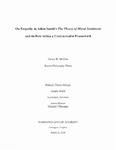| dc.rights.license | In Copyright | en_US |
| dc.creator | McGee, Grace Buckley | |
| dc.date.accessioned | 2010-07-22T19:25:27Z | |
| dc.date.created | 2010 | |
| dc.identifier | WLURG38_McGee_PHIL_2010 | |
| dc.identifier.uri | http://hdl.handle.net/11021/16291 | |
| dc.description | Thesis; [FULL-TEXT FREELY AVAILABLE ONLINE] | en_US |
| dc.description | Grace Buckley McGee is a member of the Class of 2010 of Washington and Lee University. | en_US |
| dc.description.abstract | In the eighteenth century, Scottish Enlightenment thinkers emphasized the importance of sympathy in the construction of the moral self. Among this group of philosophers, Adam Smith's moral account is especially astute. Though traditionally Smith's moral philosophy has been cast in the shadows of other Scottish philosophers, namely those of Francis Hutcheson and David Hume, Smith's The Theory of Moral Senltiments presents an exposition of moral psychology that differs from his contemporaries in important ways. A modest reading of The Theory of Moral Sentiments (hereafter the TMS) reveals a moral account that depends on a firm understanding of sympathy; it is in fact Smith's emphasis on the notion of sympathy that leads to the belief that his work merely reiterates other moral accounts that seem to rest on the very same principle. However, a close reading of the text will show that Smith's sympathy, when fully appreciated, distinguishes his account from any other. Hume, for example, offers a notion of sympathy through which we can make moral judgments from an impartial standpoint. And while Smith still uses the term 'sympathy', and also coincidentally uses the word 'impartial', his use of the terms is not equivalent to Hume's -- far from it. In contrast, the TMS presents a notion of sympathy that is better described as empathy. [taken from first page] | en_US |
| dc.description.statementofresponsibility | Grace B. McGee | |
| dc.format.extent | 45 pages | en_US |
| dc.language.iso | en_US | en_US |
| dc.rights | This material is made available for use in research, teaching, and private study, pursuant to U.S. Copyright law. The user assumes full responsibility for any use of the materials, including but not limited to, infringement of copyright and publication rights of reproduced materials. Any materials used should be fully credited with the source. | en_US |
| dc.rights.uri | http://rightsstatements.org/vocab/InC/1.0/ | en_US |
| dc.subject.other | Washington and Lee University -- Honors in Philosophy | en_US |
| dc.title | On Empathy in Adam Smith's The Theory of Moral Sentiments and Its Role Within a Contractualist Framework (thesis) | en_US |
| dc.type | Text | en_US |
| dcterms.isPartOf | RG38 - Student Papers | |
| dc.rights.holder | McGee, Grace Buckley | |
| dc.subject.fast | Theory of moral sentiments (Smith, Adam) | en_US |
| dc.subject.fast | Criticism, interpretation, etc. | en_US |
| dc.subject.fast | Empathy | en_US |
| dc.subject.fast | Ethics | en_US |
| local.department | Philosophy | en_US |
| local.scholarshiptype | Honors Thesis | en_US |
